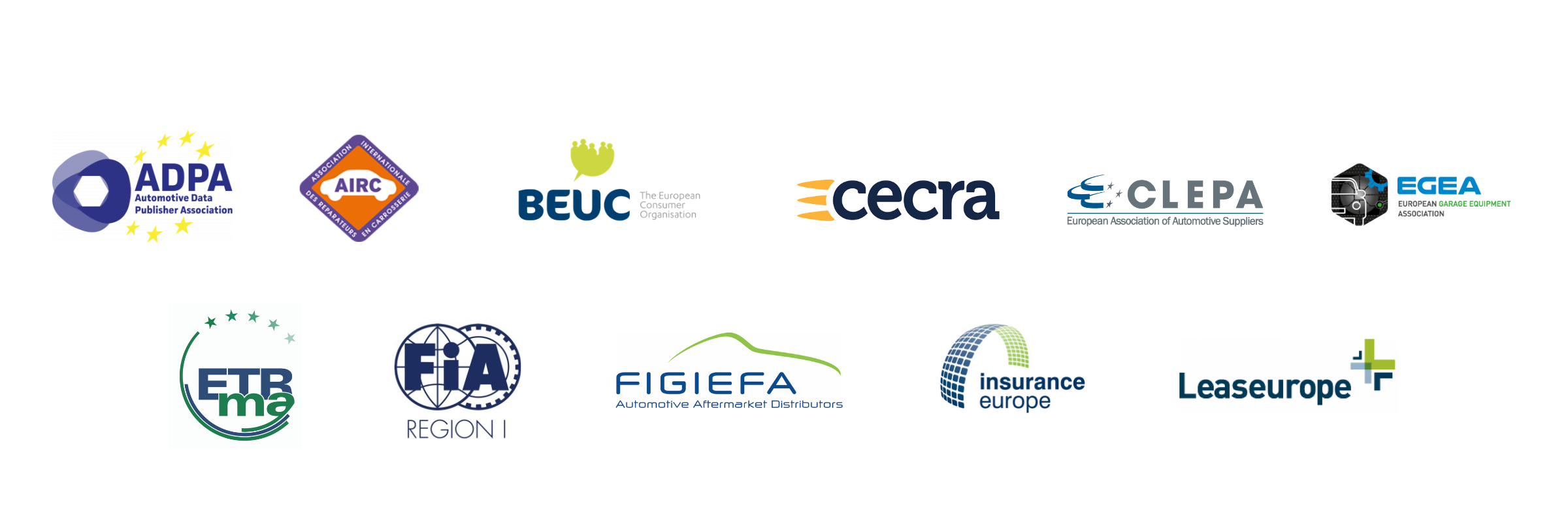Immediate action needed to unleash Europe’s connected car potential
Consumer and industry groups urge Commissioner Breton to bring forward market-enabling legislation on access to in-vehicle data, functions & resources
Brussels, 31 March 2023 – A unique and broad alliance of consumer groups, automotive suppliers, leasing and rental industries, aftermarket operators, vehicle dealers, authorised and independent workshops, data publishers, and insurers have joined forces to call on Commissioner Thierry Breton to urgently bring forward long-planned legislation on access to in-vehicle data, functions & resources.
Pro-consumer and pro-competitive legislation is essential to kick-start the development of a vibrant, innovative and competitive European market for Connected Car services, said the alliance. The Commission itself estimates this market could be worth €400bn globally by 2030.
Representing some 80% of the jobs and economic value of the European automotive and mobility eco-system, consumer and business leaders are calling on Commissioner Breton to act on the conclusive evidence gathered over the last seven years by his own officials.
This comprehensive analysis has revealed a significant hurdle to achieving fair and equal access to vehicle-generated data, which gives vehicle manufacturers an almost insurmountable advantage due to the design of the vehicle. In addition to this systemic barrier, the body of work has identified the presence of additional structural and behavioural obstacles, which only serve to compound the issue. It also warns that this problem is likely to be further intensified by the increasing involvement of Hyperscalers, who are partnering with manufacturers to embed themselves more deeply in the vehicle.
The Commission originally scheduled this legislation for adoption in 2021 and the Commission’s proposal for the Data Act itself re-stated the need for sector-specific legislation to address these issues.[1][2] The alliance urges Commissioner Breton to come forward with legally-binding sector-specific legislation by the Autumn of this year, at the very latest.
[1] Actions 52 and 53 in Communication from the Commission to the European Parliament, the Council, the European Economic and Social Committee and the Committee of the Regions on a Sustainable and Smart Mobility Strategy – putting European transport on track for the future, COM (2020) 789 final, Annex, page 3.
[2] “…new rules are needed to ensure that existing vehicle type-approval legislation is fit for the digital age and promotes the development of clean, connected and automated vehicles. Building on the Data Act as a framework for the access and use of data, these rules will address sector-specific challenges, including access to vehicle functions and resources.” Proposal for a Regulation of the European Parliament and of the Council on harmonised rules on fair access to and use of data (Data Act), COM (2022) 68 final, page 6.
Tim Albertsen, Group CEO of the global leasing company, ALD Automotive, stated:
“As we move to a world where the on-board computing power of the vehicle will grow exponentially, our duty, as a leading global mobility provider, is to deliver greener and more efficient mobility solutions by investing in new connected car services. This requires having equitable access to the data generated by the vehicles we own.
We can only do this with clear rules to ensure fair competition amongst all market players. Failure to establish sector-specific legislation for access to in-vehicle data act would be a huge, missed opportunity and highly detrimental for European investment, innovation, jobs and competitiveness.”
Representing the voice of European consumers, BEUC, Agustin Reyna added:
“With data being the new gold mine for car makers, making them the gatekeepers of drivers’ and their cars’ data is highly problematic. It is not for car manufacturers to decide who has access to this data but for consumers. The car industry has long opposed any measures that would undermine their monopoly over car data, and this must stop in the interest of competition in after-sales and related mobility services and, ultimately, consumers.”
Lorraine Frega, Executive Vice President Michelin, underscored that:
“A sectoral and legally-binding regulation on access to in-vehicle data is urgent to guarantee users’ freedom of choice, fair competition but also to enable both the deployment of zero-emission mobility and the development of a genuine European business ecosystem that is independent, efficient and competitive. As a major player in connected mobility, Michelin is asking for a level playing field to be able to continue investing and offering European consumers innovative and sustainable digital mobility services.”
Benjamin Krieger, Secretary General of CLEPA, and representing Europe’s automotive suppliers, concluded:
“The access to in-vehicle data and resources is not only crucial but absolutely imperative for automotive suppliers in Europe to survive and thrive in an ever-evolving industry. Without fair access, the entire automotive ecosystem, including suppliers and the aftermarket sector, cannot remain competitive versus tech giants that are already dominating the infotainment systems of vehicles, nor can we continue to innovate the components and services that meet new digital demands.”

Attachments
In: CLEPA News, Connectivity & Automation, Cybersecurity, Data



